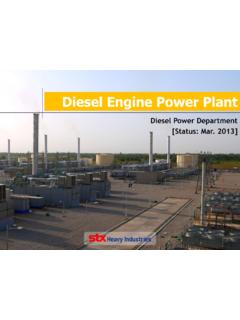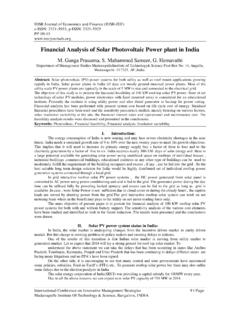Transcription of POWER GENERATION SKILL STANDARDS Plant Operators ... - TSSB
1 Page 1 POWER GENERATION SKILL STANDARDS Plant Operators Plant Mechanics Page 2 FOR MORE INFORMATION Barbara Hins-Turner Executive Director Center of Excellence for Energy Technology Centralia College 600 W Locust Centralia, WA 98531-4099 Phone: 360-736-9391, extension 477 COPYRIGHT 2006 State of Washington through the State Board for Community and Technical Colleges Unless otherwise provided, data which originates from this agreement shall be works for hire as defined by the Copyright Act of 1976, and shall be owned by the State of Washington. Data shall include, but not be limited to, reports, documents, pamphlets, advertisements, books, magazines, surveys, studies, computer programs, films, tapes, and/or sound reproductions. Ownership includes the right to copyright, patent, register, and the ability to transfer these rights.
2 PROJECT FUNDING This project was made possible through skills Panel grant funding awarded by the Washington State Workforce Training and Education Coordinating Board PERMISSION TO General permission is granted for educators to photocopy and quote limited material from 2006 POWER GENERATION SKILL STANDARDS for noncommercial instructional or scholarly use. Permission must be sought from the Washington State Board for Community and Technical Colleges in order to charge for photocopies, to quote material in advertising, or to reprint substantial portions of the document in other publications. Credit should always be given to the source of the photocopies or quotes by citing a complete reference. TO ORDER ADDITIONAL Additional copies of this document are available for $20 plus shipping and handling fees. Use the order form at the back of this document.
3 Proceeds from sales are applied to reprinting this document. Document and lead technical writing by Terryll Bailey, The Allison Group 206-525-7175 or Writing by Barbara Hins Turner, Center of Excellence for Energy Technology, 360-736-9391 X477 or Scenarios by Jay Pickett, PSE Hydro Operations and Dale Singer, Bureau of Reclamation, Grand Coulee Dam Operations Editing by Alan Hardcastle, WSU Social and Economic Sciences Research Center, 360-586-2277 or Document design and layout by Colleen Clark, Centralia College Cover photograph provided by Puget Sound Energy, Snoqualmie Falls Project Printing by Capitol City Press and Centralia College Page 3 Acknowledgements This document is the result of the collaborative efforts of industry, labor, education, government, workforce and economic boards successfully working together through the Centralia College Center of Excellence for Energy Technology partnership.
4 The POWER GENERATION SKILL STANDARDS document could not have happened without all partners. Literally, thousands of hours were invested. A special thanks to all who contributed, and especially to Dr Alan Hardcastle, Washington State University Senior Researcher, Terryll Bailey, President, The Allison Group, IBEW Local #77 and the employers who encouraged their workers to participate in the focus groups. Their countless hours of work on behalf of the SKILL STANDARDS are greatly appreciated. Washington State Workforce Training and Education Coordinating Board Pam Lund, Associate Director Jamie Krause, Economic Development Program Specialist Washington State Board for Community and Technical Colleges Jim Crabbe, Director, Workforce Education Michelle Andreas, Workforce Education Policy Associate Project Development and Coordination Alan Hardcastle, Research Associate, WSU Social and Economic Sciences Research Center Terryll Bailey, President, The Allison Group Barbara Hins-Turner, Executive Director, Centralia College, Center of Excellence for Energy Technology Cindy Mann, Assistant, Centralia College, Center of Excellence for Energy Technology The Steering Committee Steve Milistefr, BPA, Chair, Center of Excellence Advisory Board Arlene Abbott, Manager Organizational Development.
5 Chelan County PUD Bob Guenther, President, Thurston, Lewis, Mason, CLC, Vice President, 3rd District Washington State Labor Council AFL/CIO Jay Pickett, Hydro Operations Supervisor, PSE Dale Singer, Senior Operator, Bureau of Reclamation, Grand Coulee Dam Focus Group Participants The focus groups consisted of front-line workers, first line supervisors and professionals in the POWER GENERATION industry within the Pacific Northwest POWER grid region. They determined the critical work functions and key activities performed by POWER GENERATION Plant Operators and mechanics. They then listed the performance indicators, technical knowledge, skills and abilities, and employability skills required to succeed in this field. Their insights were an invaluable contribution to this work. Mechanic and operator panels meet to develop long-awaited SKILL STANDARDS for the industryby Dale Singer, Operations Specialist, Bureau of Reclamation, Grand Coulee DamDale Singer during a recent visit to the Centralia College Center of MECHANICSH osted by PSE at Snoqualmie Falls ProjectFebruary 1-2, 2006 Guy Elms - PSEQ uentin Elms - PSES teven Ferris - Grand Coulee DamTodd Fosness - PSEDan Fugate - TransAltaDenis Kern - PGEC hristopher Martin - IBEW Local #77 Chad Miller - Douglas PUDB rian Odell - Chelan PUD Ron Jacobson - Tacoma POWER Steven VanDusen - PSEPLANT OPERATORSH osted by Chelan PUD and Douglas PUD at Rocky Reach DamFebruary 7-8, 2006 Todd Arendt - TransAlta Jim Byrd - Lewis County PUD Calvin Christoph - PSEW ayne Grevell - Chelan PUDRyan Mathena - TransAlta Jay Pickett - PSE Dale Singer - Bureau of Reclamation.
6 Grand Coulee DamMichael Prey - Douglas County PUD Jim Kaiser - Chelan PUD The operator panel met at Rocky Reach Dam to develop their part of the SKILL mechanic panel traveled to the PSE Snoqualmie facility for their SKILL STANDARDS industry is faced with the fact that the Baby Boomers will be starting to retire. We will see losses of around 50% of our experienced, qualified, knowl-edgeable journeyman workforce. Combine this with the fact that for decades our industry has had a low turnover rate due to good pay, benefits, and job security requiring little training for new employ-ees. Because of this, training budgets were cut and training programs were eliminated, placing us be-hind in our programs. Traditional journeyman train-ing programs range from three to five years (6,000 to 10,000 hours), meaning that if we start today we will be years behind in training plus there will be little transfer of knowledge from the existing workforce to the new of this I feel it is important to look at new ways of training our future workforce, hence the Cen-ter of Excellence.
7 The community college system for a significant number of years has had excellent pro-grams that have helped industry and provided qual-ity education at a cost lower than more traditional four-year institutions. It seems logical for the energy industry to partner with these institutions. By pre-senting industries needs in training the colleges can modify current classes to meet our needs. Courses like AC and DC theory are the same for utilities as they are for an electrician or electrical engineer. If we can have the colleges teach courses like communications, computers, AC and DC theory, mechanical theory, and even some hands-on classes like welding and HVAC, this can drastically reduce our costs. It becomes a bigger benefit to the POWER industry in finding a pool of workers that would bet-ter serve our needs. How nice it would be for man-agement to hire workers that have already shown motivation and taken the initiative of going to class on their steps have been started to achieve this.
8 Centralia College has been in contact with industry to find out our needs. They received a grant to de-velop a skills panel for mechanic and operator in the GENERATION side of our industry. Over two different two-day sessions industry provided ten mechanics and ten Operators at a pretty good expense to in-dustry to help develop these SKILL sets. These indi-viduals were the actual hands-on personnel who do these jobs and know what it takes to be an opera-tor or mechanic. Using this information faculty will be able to develop courses and a curriculum for a degree program so we could hire employees into an advanced step apprenticeship program. A further benefit to industry will be the common course num-bering from one college to the next that participate in this program. With this, industry can feel con-fident that someone hired from Centralia College will have the same course work as someone from Wenatchee Valley or any other college that partici-pates in the partnering and working together industry can revive their training programs and save time and money in doing so.
9 The colleges can do what they do best: teach; industry can do what they do best: train about the specifics of our facilities. Most impor-tantly we will not sacrifice anything in the quality of the end product, our journeyman. Building a set of industry SKILL STANDARDS gives us the chance to develop training programs that are supported and needed as we prepare new people in energy technology. I think students will come from far and wide to take advantage of the training as it becomes more well known in the region. Dr. Jim Walton, president, Centralia College Page 5 Special Thanks The POWER GENERATION SKILL STANDARDS project was launched at the Grant County PUD SeaTac conference room where industry training supervisors, Plant managers and labor representatives determined the scope of the POWER GENERATION skills project. Amazing project results were achieved in two day work sessions for Plant mechanics hosted by PSE Snoqualmie Plant and Plant Operators hosted by Chelan County PUD and Douglas County PUD at Rocky Reach Dam.
10 The resource costs for this project were high, but the results provide a knowledge capture of the skilled crafts that will serve industry, labor and educational needs as we collaboratively create a benchmark standard for the POWER GENERATION workforce. We sincerely thank our industry and labor partners for supporting this work. The POWER GENERATION SKILL STANDARDS Project Outcomes The following are the outcomes of POWER GENERATION SKILL STANDARDS , as determined by the partnership: SKILL STANDARDS needed for POWER GENERATION careers consistent with the current and future needs of the public and business Verification of worker input by written survey A report for POWER GENERATION employers, labor unions and educators showing the STANDARDS and the data that supported those STANDARDS The Next Steps The completion of the SKILL STANDARDS represents phase one of this endeavor.








